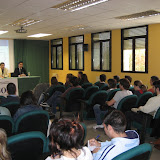The Web of Data is here to stay... and will be full of Public Sector Information
 Yesterday I was speaking at the PSI Meeting 2010, that in my opinion was a great success for all the PSI community, which is a very important part of the open data movement. With an excellent organization by Spanish Proyecto Aporta and the European Commission's project ePSIPlaform, many people interested in the reuse of PSI around European Union, and even from Hong Kong, met in Madrid.
Yesterday I was speaking at the PSI Meeting 2010, that in my opinion was a great success for all the PSI community, which is a very important part of the open data movement. With an excellent organization by Spanish Proyecto Aporta and the European Commission's project ePSIPlaform, many people interested in the reuse of PSI around European Union, and even from Hong Kong, met in Madrid.
It was a very intense day, with 19 thoughtful speeches made by people coming from public administrations (including European Commission) and platforms, companies that reuse information and Trade Associations representing their interests and civil society organizations. I was specially impressed by the honest description of how some civil servants face the unlocking of their own data made by Catherine Lippert; the didactic description of open data picture and issues presented by Daniel Dietrich and the inspiration of the examples and replicas made by Chris Taggart.
But I am also worried about the strength that the business case trend is taking. Many voices, including the European Commission are asking to measure something that it is not possible to measure for the moment. I would say that if a company is willing to make an investment to develop a business model based on the reuse of a certain PSI, that should be enough proof of usefulness. If it doesn't work the only one who will lose is the company who is taking the risk. The information is being produced anyway and we should not ask the public bodies to over-engineer the formats or to build easy to use and expensive to exploit APIs. At least for the moment and at least during economic downturn. That can be part of the investments the companies can make. So please RAW DATA NOW!.
With these conditions, the business case will be built by itself in a few years for very little money. Because what we know for sure is what Marc de Vries said about the direct relation between access and reuse "No access, no reuse". And information industries need the raw material that represent raw data to innovate, specially as an stimulus for the recovery. It is not that difficult and I really think it is not that expensive. It is more a matter of will by the information holders.
There were many take-aways from all the presentations and round tables, so I recommend you to read the tweet stream of the PSI Meeting 2010, where you will find many of them. You will discover that many of the speakers are also twitterers and you can follow their activities on open data. And that in the public sector, even in Spain, there are many people like Alberto Ruiz de Zárate or Amalia Velasco that can make things happen.
For me the best part was to see that there is great group of brilliant people that are really committed to the objective of making Public Sector Information open and reusable for the benefit of citizens and businesses. And as usual in big causes, the best of them are volunteers. For the first time since I am following the open data community I really have the feeling that we are not very far from a big domino effect (as Catherine defined) that will make great things to happen... despite the business-casers.







